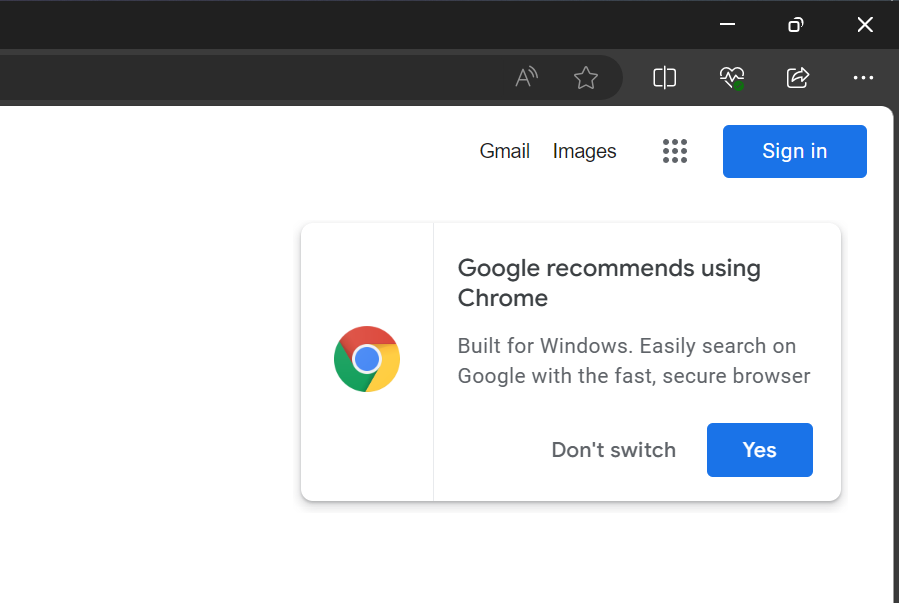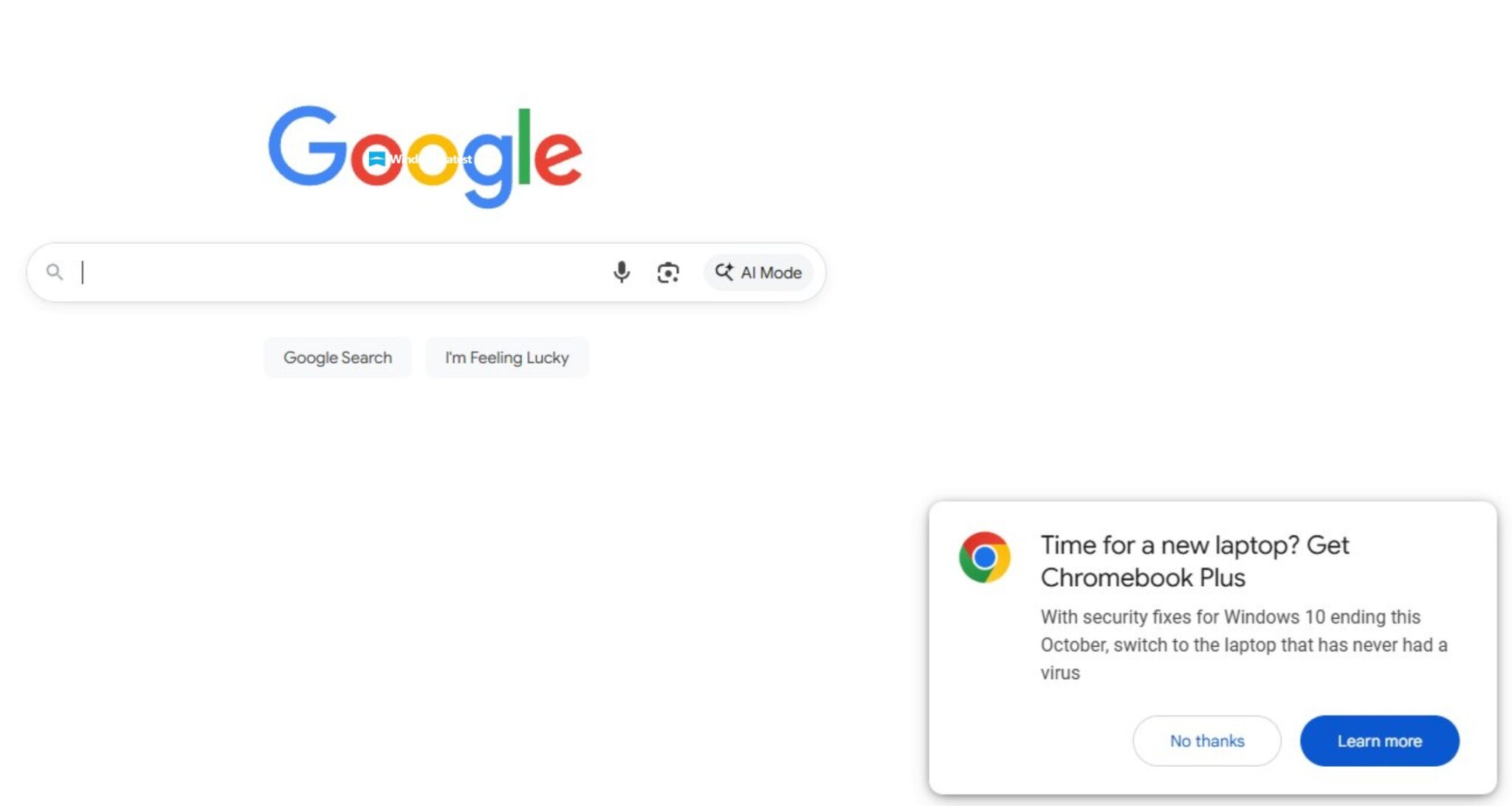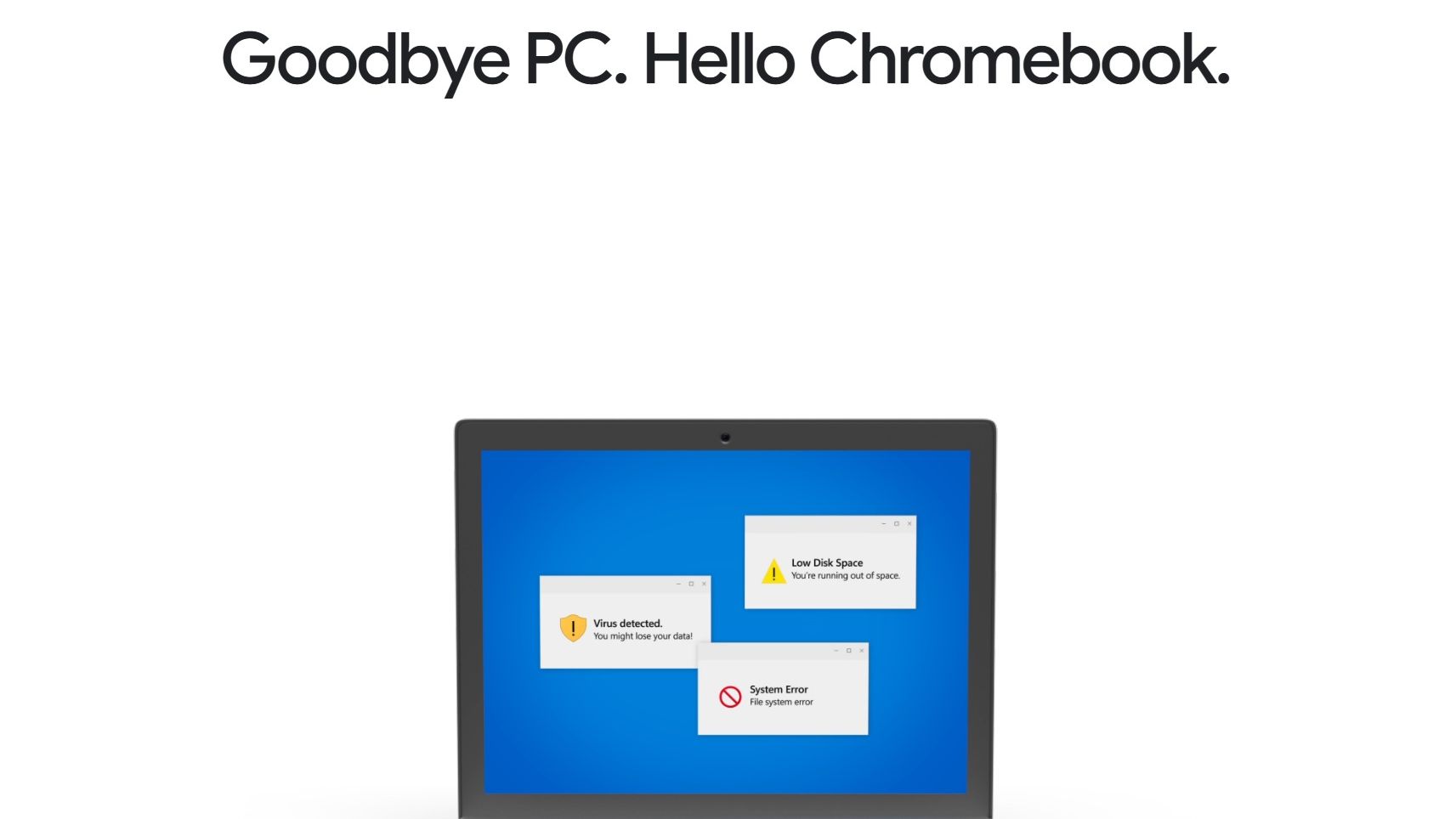
Microsoft will stop supporting Windows 10 on October 14, 2025. After this date, it won’t receive any more security updates, which could leave many users vulnerable to threats.
Around 2020, Windows 10 became incredibly popular with over 700 million users. However, as of 2025, many people are unable to upgrade to Windows 11 because their computers don’t meet the necessary hardware specifications.
Google is now directly appealing to Windows 10 users with a new advertising campaign for Chromebooks and ChromeOS. The ads focus on potential security problems with Windows and position Chromebooks as a more secure option because they receive frequent updates.
Google’s Chromebook push
Google is now displaying ads on its own website, Google.com, highlighting Chromebook Plus laptops. One ad points out that security updates for Windows 10 will stop in October, suggesting people switch to Chromebooks which haven’t had any viruses. The ads clearly emphasize the upcoming end of Windows 10 security support.
The advertisement implies Windows 10 is vulnerable to security threats, particularly when contrasted with Chromebooks. It reinforces this message by visually depicting a typical laptop with a virus warning on a blue screen similar to what Windows users see.


Google is really trying to get people to use Chromebooks, but it’s difficult to see a mass shift happening. While ChromeOS works well in schools, it still has some drawbacks that will likely prevent many users from switching.
This isn’t the first time Google has tried this. We previously reported in March that Google was already encouraging users to switch, knowing that Windows 10 support would end in October.
It’s not just Google acting this way – Microsoft also encourages Bing users to stay with their Edge browser when they see someone trying to download Chrome. So, it’s understandable that Google responds in kind.
The Windows 10 upgrade dilemma
As a tech enthusiast, I’m still seeing Windows 10 on almost half of all computers out there. It’s a little surprising, honestly, because Windows 11 is at around 40% adoption – Microsoft was probably hoping for a faster switchover.
The biggest issue preventing people from upgrading is that Windows 11 requires specific hardware – namely, TPM 2.0 and Secure Boot – which many older computers don’t have.
Over 200 million computers can’t be upgraded to the latest version due to certain limitations. This leaves users with a difficult decision: they can purchase a new computer that’s compatible with the update, pay Microsoft for continued security protection (unless they’re in Europe, where it’s free for another year), continue using their current computer without updates and risk security vulnerabilities, or explore other operating systems.
Google hopes people will switch to ChromeOS, but many users still recommend Linux as a good alternative.
Chromebook opportunities and limitations
I was surprised to find that Chromebooks are still very popular, especially in schools. Many school districts in the U.S. and Canada use them because they’re affordable and simple to manage, and Microsoft has been trying to compete with them in the education market for quite some time.
Google’s ChromeOS Flex lets you install an operating system on older Windows computers, effectively giving them a fresh start without the need to purchase new devices.
I’ve always been impressed with Chromebooks – they’re usually really affordable and feel pretty safe to use. Plus, they update themselves automatically, which is a huge plus! The quality of how they’re made can be a little hit or miss, but honestly, the low price and how little upkeep they need is a big draw for me.

Google even highlights that ChromeOS has had zero reported ransomware attacks, which is impressive.
Switching to ChromeOS does have some drawbacks. You won’t be able to use Windows applications, it requires a consistent internet connection to function best, and generally offers less storage space and battery life than a standard laptop.
For everyday things like surfing the web, writing documents, or doing school assignments, a Chromebook or device running ChromeOS can be a really good value.
What this means for users and the market
With Windows 10 no longer supported, many users will need to choose a new operating system. Google is understandably trying to attract those users to its products.
Despite these points, it’s likely most users will ultimately purchase a new computer with Windows 11, pay for continued software updates, or find some other solution to keep their systems running.
I’m interested to know why some of you are still using Windows 10. What’s preventing you from upgrading? Is it because your computer doesn’t meet the requirements, the upgrade costs too much, or is there another reason?
via Windows Latest

Stay up-to-date with the latest news, insights, and features from Windows Central by following us on Google News!
Read More
- How to Get the Bloodfeather Set in Enshrouded
- The Pitt Season 2, Episode 7 Recap: Abbot’s Return To PTMC Shakes Things Up
- 4 TV Shows To Watch While You Wait for Wednesday Season 3
- Every Targaryen Death in Game of Thrones, House of the Dragon & AKOTSK, Ranked
- Goat 2 Release Date Estimate, News & Updates
- Where Winds Meet: How To Defeat Shadow Puppeteer (Boss Guide)
- Felicia Day reveals The Guild movie update, as musical version lands in London
- Best Thanos Comics (September 2025)
- One of the Best EA Games Ever Is Now Less Than $2 for a Limited Time
- 10 Movies That Were Secretly Sequels
2025-10-03 17:10